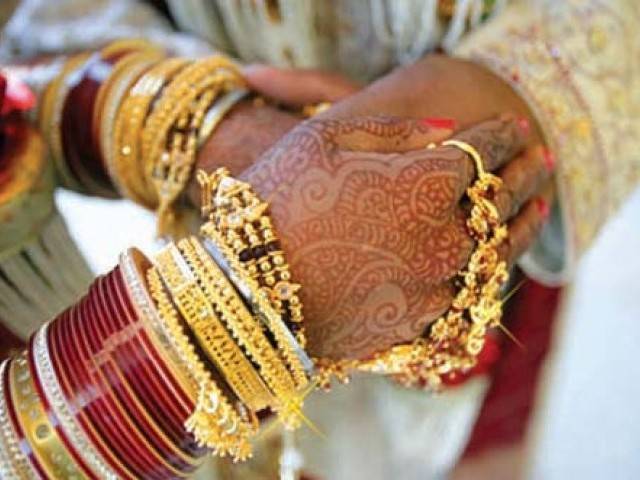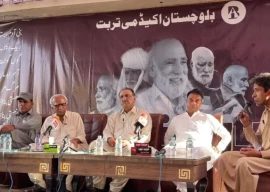
The National Assembly’s standing committee on law and justice last week (Aug 17) tabled its report on ‘The Hindu Marriage Bill, 2016’, which had been pending with the panel since March last year.
Christian clerics, MPs invited to vet marriage bill
Once passed, it would be good news practically for the women of the Hindu community. The proposed legal framework addresses matters of registration of marriage, divorce and inheritance. More importantly, it will grant widows the legal right to re-marry.
The draft law, which has undergone many changes since it was tabled, was originally moved by two minority law makers, Ramesh Lal of the PPP and Asiya Nasir of JUI-F. It finally secured the backing of the PML-N and opposition parties.
“I think this will be the (law’s) final version. The government is saying it will hold a discussion on it before passing it,” Ramesh told The Express Tribune.
Through a proposed amendment in the law’s original draft, its scope has been broadened from just the federal capital to include Punjab, Balochistan and Khyber-Pakhtunkhwa.
Sindh took the lead by enacting a similar law last year, but this law is mainly limited to the registration of Hindu marriages. It did not touch upon contentious issues relating to divorce, ostensibly because of opposition by upper caste Hindus that dominate the minority’s politics in the province where most of the country’s Hindus live.
Sindh Assembly becomes first in Pakistan to pass Hindu marriage bill
Some upper caste Hindu groups had been opposing the very option of divorce, claiming that there was no such concept in the Hindu religion.
According to Lal, if any individual member still has an objection to a particular clause, he or she should respect the decision of the majority and support the bill in the larger interest of the Hindu community.
Absence of a legal mechanism for registration and other aspects of marriage had been creating problems for the Hindu community, especially women and members of marginalised lower castes in getting travel and identity documents and in the matter of property transfer.
Landmark achievement
In what would be a landmark achievement for the rights for Hindu women, a widow would gain the right to re-marry.
“A Hindu widow shall have right to re-marry of her own will and consent after the death of her husband provided a period of six months has lapsed after the husband’s death,” reads the amended version of Clause 17 of the bill. This would help remove a taboo in the Hindu community where widows are barred from re-marrying.
The committee in its final report removed the contentious Clause 12-(iii) in the original draft under which a marriage could be annulled if one of the life partners converted to another religion. However, Dr Ramesh Kumar, a PML-N member, insists that the clause has not been removed.
To provide financial security to wife and children, another clause has been added, under which if a wife is a respondent in a petition for termination of marriage, she can oppose the grant of a decree on grounds that the termination of marriage may result in grave financial hardship to her, unless arrangements are made to the satisfaction of the court to eliminate such hardship.
In such cases, the court will not pass a decree of termination unless it is satisfied that adequate provisions for the maintenance of children have been made in line with the financial capacities of both parties.
Termination of Hindu marriage
Both parties can present a petition for termination of marriage on the ground that they have not been able to live together and have been living separately for a period of one year or more. In such a case, the court will give six more months for reconciliation. If they fail to do so, the court will issue a decree for termination of marriage within 18 months of submitting such a petition.
Hindu marriage bill ready for parliamentary nod
Separated person may marry again
Once a Hindu marriage has been annulled or terminated, and the time to appeal has expired or it is dismissed, it will be lawful for both parties to marry again six months after the final decision.
Besides other provisions, the new draft grants a woman right to apply for termination of marriage if she is treated with ‘cruelty’, or husband fails to provide for her maintenance for a period of two years.
The Law would fix minimum age of 18 years for a Hindu girl to get married.
Once the law is passed, government would appoint marriage registrars in districts and areas where Hindu community has significant population.
“It was so unfair that there was no mechanism available even for registration of Hindu marriages in the country,” remarked the co-mover of the bill Asiya Nasir, a Christian member from the Jamiat Ulema-i-Islam-Fazl (JUI-F).
PML-N’s Dr Ramesh Kumar still has some reservations. “I had proposed some stringent clauses on forced conversions in this bill which have been ignored,” he said.
One of his proposals was to inculcate a clause whereby neither of the partners was allowed to change their religion unless they got a separation decree first, he added.
He said that he would still support the bill when it was put up for a vote in the assembly and hoped it would be improved in future through necessary amendments.
Published in The Express Tribune, August 22nd, 2016.

















COMMENTS (1)
Comments are moderated and generally will be posted if they are on-topic and not abusive.
For more information, please see our Comments FAQ